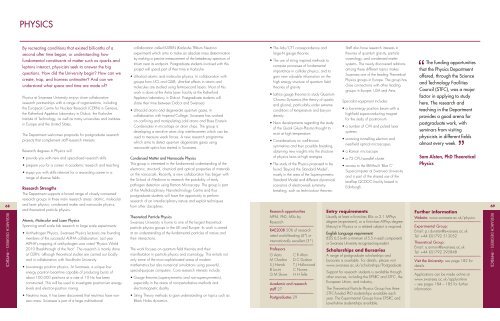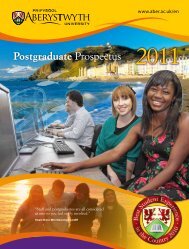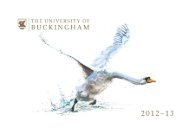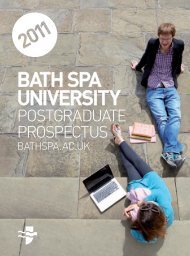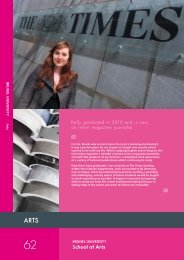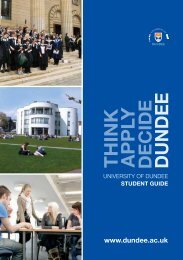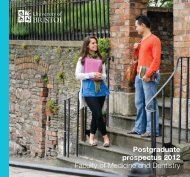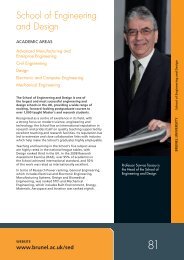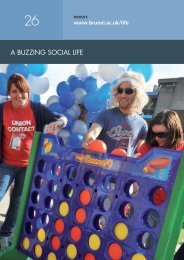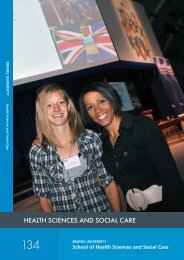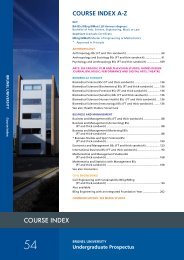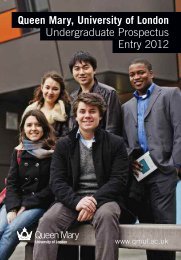www.swansea.ac.uk Postgraduate Prospectus 2012
www.swansea.ac.uk Postgraduate Prospectus 2012
www.swansea.ac.uk Postgraduate Prospectus 2012
- No tags were found...
Create successful ePaper yourself
Turn your PDF publications into a flip-book with our unique Google optimized e-Paper software.
PHYSICS68RESEARCH DEGREES – PHYSICSBy recreating conditions that existed billionths of asecond after time began, or understanding howfundamental constituents of matter such as quarks andleptons inter<strong>ac</strong>t, physicists seek to answer the bigquestions. How did the University begin? How can wecreate, trap, and harness antimatter? And can weunderstand what sp<strong>ac</strong>e and time are made of?Physics at Swansea University enjoys close collaborativeresearch partnerships with a range of organisations, includingthe European Centre for Nuclear Research (CERN) in Geneva,the Rutherford Appleton Laboratory in Didcot, the KarlsruheInstitute of Technology, as well as many universities and institutesin Europe and the United States.The Department welcomes proposals for postgraduate researchprojects that complement staff research interests.Research degrees in Physics will:• provide you with new and specialised research skills• prepare you for a career in <strong>ac</strong>ademic research and te<strong>ac</strong>hing• equip you with skills relevant for a rewarding career in arange of diverse fields.Research StrengthsThe Department supports a broad range of closely connectedresearch groups in three main research areas: atomic, molecularand laser physics; condensed matter and nanoscale physics;and theoretical particle physics.Atomic, Molecular and Laser PhysicsSpanning small scale lab research to large scale experiments:• Antihydrogen Physics. Swansea Physics lecturers are foundingmembers of the successful ALPHA collaboration. Last yearALPHA's trapping of antihydrogen was voted "Physics World2010 Breakthrough of the Year". The research is mainly doneat CERN, although theoretical studies are carried out locallyand in collaboration with Stockholm University• Low-energy positron physics. At Swansea, a unique lowenergy positron beamline capable of producing bursts ofabout 100,000 positrons at a rate of 10 Hz has beenconstructed. This will be used to investigate positronium energylevels and electron-position mixing• Neutrino mass. It has been discovered that neutrinos have nonzeromass. Swansea is part of a large multinationalcollaboration called KATRIN (Karlsruhe TRItium Neutrinoexperiment) which aims to make an absolute mass determinationby making a precise measurement of the betadecay spectrum oftritium near its endpoint. <strong>Postgraduate</strong> students involved with thisproject will spend part of their time in Karlsruhe• Ultra-fast atomic and molecular physics. In collaboration withgroups from UCL and QUB, ultra-fast effects in atoms andmolecules are studied using femtosecond lasers. Most of thiswork is done at the Astra Laser F<strong>ac</strong>ility at the RutherfordAppleton Laboratory in Didcot. <strong>Postgraduate</strong> students willshare their time between Didcot and Swansea• Ultr<strong>ac</strong>old atoms and degenerate quantum gases. Incollaboration with Imperial College, Swansea has workedon confining and manipulating cold atoms and Bose EinsteinCondensates in microtraps on atom chips. The group isdeveloping a sensitive atom chip interferometer which can beused to measure weak forces. A new research programmewhich aims to detect quantum degenerate gases usingnanoscale optics has started in Swansea.Condensed Matter and Nanoscale PhysicsThis group is interested in the fundamental understanding of theelectronic, structural, chemical and optical properties of materialson the nanoscale. Recently, a new collaboration has begun withthe School of Medicine to research the possibility of earlypathogen detection using Raman Microscopy. The group is partof the Multidisciplinary Nanotechnology Centre and thuspostgraduate students will have the opportunity to performresearch of an interdisciplinary nature and exploit techniquesfrom other disciplines.Theoretical Particle PhysicsSwansea University is home to one of the largest theoreticalparticle physics groups in the UK and Europe. Its work is aimedat an understanding of the fundamental particles of nature andtheir inter<strong>ac</strong>tions.The work focuses on quantum field theories and theirmanifestation in particle physics and cosmology. This entails notonly some of the most sophisticated areas of modernmathematics but also numerical simulations using powerful,special-purpose computers. Core research interests include:• Gauge theories (supersymmetric and non-supersymmetric),especially in the areas of non-perturbative methods andelectromagnetic duality• String Theory methods to gain understanding on topics such asBl<strong>ac</strong>k Holes dynamics• The Ads/CFT correspondence andlarge-N gauge theories• The use of string inspired methods tocompute processes of fundamentalimportance in collider physics, and togain new valuable information on thehigh energy structure of quantum fieldtheories of gravity• Lattice gauge theories to study QuantumChromo Dynamics (the theory of quarksand gluons), particularly under extremeconditions of temperature and baryondensity• New developments regarding the studyof the Quark Gluon-Plasma thought toexist at high temperature• Considerations on well-knownsymmetries and their possible breaking,obtaining new insights into the structureof physics laws at high energies• The study of the Physics proposed to befound ‘Beyond the Standard Model’,mostly in the area of the SupersymmetricStandard Model and different dynamicalscenarios of electroweak symmetrybreaking, such as technicolour theories.Research opportunitiesMPhil, PhD, MSc byResearchRAE2008 50% of researchrated world-leading (4*) orinternationally excellent (3*)ProfessorsG AartsM CharltonS J HandsB LuciniG M ShoreAcademic and researchstaff 27<strong>Postgraduate</strong>s 29C R AltonD C DunbarT J HollowoodC NunezH H TelleStaff also have research interests intheories of quantum gravity, particlecosmology, and condensed mattersystems. The newly discovered relationsamong these different topics makesSwansea one of the leading TheoreticalPhysics groups in Europe. The group hasclose connections with other leadinggroups in Europe, USA and Asia.Specialist equipment includes:• a low-energy positron beam with ahighfield superconducting magnetfor the study of positronium• a number of CW and pulsed lasersystems• scanning tunnelling electron andnearfield optical microscopes• a Raman microscope• a 72 CPU parallel cluster• <strong>ac</strong>cess to the IBM-built ‘Blue C’Supercomputer at Swansea Universityand is part of the shared use of theteraflop QCDOC f<strong>ac</strong>ility based inEdinburgh.Entry requirementsUsually at least a first-class BSc or 2.1 MPhysdegree (experiment), or a first-class MPhys degree(theory) in Physics or a related subject is required.English Language requirement:IELTS 6.5 (with a minimum of 5.5 in e<strong>ac</strong>h component)or Swansea University recognised equivalent.Scholarships and BursariesA range of postgraduate scholarships andbursaries is available. For details, please visit<strong>www</strong>.<strong>swansea</strong>.<strong>ac</strong>.<strong>uk</strong>/scholarships/<strong>Postgraduate</strong>Support for research students is available throughother sources, including the EPSRC and STFC, theEuropean Union, and industry.The Theoretical Particle Physics Group has threeSTFC-funded PhD studentships available e<strong>ac</strong>hyear. The Experimental Groups have EPSRC andLeverhulme studentships available.“The funding opportunitiesthat the Physics Departmentoffered, through the Scienceand Technology F<strong>ac</strong>ilitiesCouncil (STFC), was a majorf<strong>ac</strong>tor in applying to studyhere. The research andte<strong>ac</strong>hing in the Departmentprovides a good arena forpostgraduate work, withseminars from visitingphysicists in different fieldsalmost every week.”Sam Alston, PhD TheoreticalPhysicsFurther informationWebsite: <strong>www</strong>.<strong>swansea</strong>.<strong>ac</strong>.<strong>uk</strong>/physicsExperimental Group:Email: p.r.dunstan@<strong>swansea</strong>.<strong>ac</strong>.<strong>uk</strong>Tel: +44 (0)1792 513052Theoretical Group:Email: a.armoni@<strong>swansea</strong>.<strong>ac</strong>.<strong>uk</strong>Tel: +44 (0)1792 295848Visit the University: see page 182 fordetailsApplications can be made online at<strong>www</strong>.<strong>swansea</strong>.<strong>ac</strong>.<strong>uk</strong>/applyonline– see pages 184 – 185 for furtherinformation.69RESEARCH DEGREES – PHYSICS


